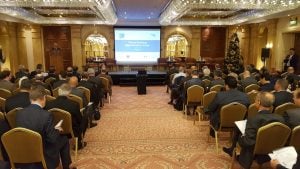By Sami Zaptia.

Malta, 7 December 2016:
The inaugural Mediterranean Business Networking Forum 2016 came to a successful conclusion here in Malta yesterday with delegates going away with cautious optimism.
The event, under the banner “Future Business Opportunities in Libya”, brought together over 200 delegates of various nationalities, but mainly Libyan, British and Maltese.
Delegates from various sectors gathered to discuss the potential of doing business in Libya and to enable Libyans and internationals to renew old ties and to form new contacts.
Habib Al-Amin, Libya’s charge d’affairs in Malta kicked off the formal speeches saying that Libya is full of potential with experienced manpower ready to move forward in order to play it role in the region’s economic development.
Malta’s Minister for Economy, Investment and Small Business, Christian Cardona, said that unfortunately intra Mediterranean trade was low and that new economic models were needed in order to boost it.
He added that there was a need for synergies and trust for improved trade as well as integration between the EU and the Maghreb .
Cardona said that more trade would lead to more development and growth as well as peace and stability in the region. A secure Mediterranean is important for Europe, he added.
Vincent Fean, chairman of the Libyan British Business Council (LBBC), leadiing 26 delegates attending the event, said that his members had come to deepen relations with both the public and the private sector. Malta was a key link between British and Libyan business, especially in turbulent times.
He stressed that security, stability and prosperity were all intertwined, and that the 70 companies that the LBBC represent want to help Libya develop every aspect of the economy. He hoped that the event would be repeated next year probably in Tunis and hoped many Libyans would attend.
After the formal speeches were concluded, two panel sessions took part: one on Libya’s economic overview and the second on the Libyan private sector.
The panel sessions were popular with delegates as it enabled them to put forward questions to the various panelists.
The panels included leading private sector companies, the Investment Manager from the NOC, the General Union of (Lbyan) Chambers of Commerce, a member of the House of Representatives and leading Libyan and international law firms.
The robust question and answer session covered a wide range of topics including doing business in Libya, foreign investment laws, diversification, getting paid, Dinar devaluation, state sector versus the private sector, the Central Bank of Libya and the opening of Letters of Credit and compliance.
Most delegates found the event useful but hoped that more representatives from state institutions would be able to attend the next edition.
All agreed that security and stability within Libya were a prerequisite for meaningful business engagement in Libya.









